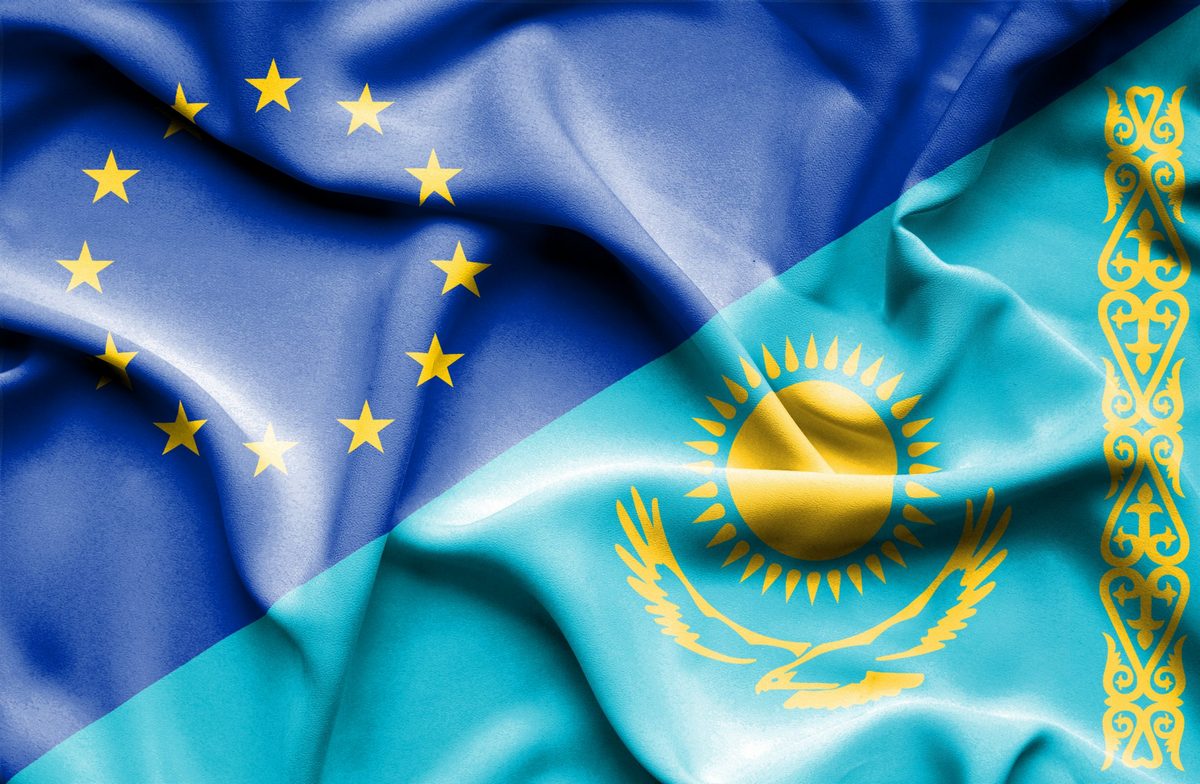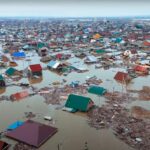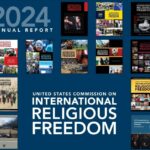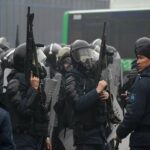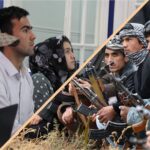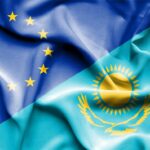A new human rights-focused dialogue between the EU and Kazakhstan’s government is scheduled to take place in Brussels on 9 March 2023. The dialogue comes at a time when the EU is seeking to establish closer ties with Kazakhstan and the other Central Asian countries in the changing geopolitical reality that has evolved due to Russia’s war against Ukraine.
Ahead of the meeting, International Partnership for Human Rights (IPHR) and Kazakhstan International Bureau for Human Rights and Rule of Law (KIBHR) have submitted briefing information to the EU on issues of major concern regarding civil society space and the protection of fundamental rights and freedoms in Kazakhstan. We urge the EU to raise these issues as a matter of priority during the dialogue and to insist on concrete and effective measures by Kazakhstani authorities to address them.
Lack of accountability for human rights violations related to the January 2022 protests
A key concern is the continued failure of the Kazakhstani authorities to take effective measures to impartially and thoroughly investigate and to hold accountable those responsible for serious human rights violations reported during the ‘Bloody’ January 2022 events, when authorities forcibly put down mass protests for social and political change and evolving unrest. Reported violations include the excessive use of force and related killings of protesters and passers-by, arbitrary detentions of thousands of protesters, and widespread torture and ill-treatment of protesters in detention. Many investigations opened into killings and torture allegations have been prematurely closed due to the alleged lack of evidence of crimes in the actions of law enforcement and security officials involved, and only a few cases against officials accused of violations have gone to court, with even fewer convictions handed down to date. There are also concerns that the implementation of the amnesty law adopted in relation to the January events might allow some law enforcement and security officials to escape responsibility for human rights violations.
Ongoing persecution of government critics and opponents
In the aftermath of the January 2022 events, President Tokayev launched a political modernisation drive aimed at creating ‘’a new Kazakhstan’’. While some welcome steps have been taken as part of this drive, most reforms have been limited in nature. In addition, the modernisation initiative is undermined by ongoing persecution of those who criticise and challenge the government’s policies, including opposition groups; opposition, civil society and human rights activists; independent media and journalists; and peaceful protesters speaking out against government policies.
No opposition parties registered
As part of his modernisation drive, President Tokayev pledged to make it easier for political parties to register. However, while the number of members or supporters needed for registration has been reduced, and two new parties have been registered, opposition parties continue to face difficulties with obtaining state registration. As a result, currently no genuine opposition party is registered in the country or, thus, able to take part in the early parliamentary elections, which will be held on 19 March 2023. For example, despite repeated attempts since last spring, the opposition party Alga Kazakhstan! has been unable to register and has had its application documents returned ten times because of alleged inconsistencies with the technical requirements for registration.
At the March elections, 70 precent of the members of parliament will as previously be elected based on party lists, while the rest will be elected from single-mandate constituencies, where parts of the candidates are self-nominated, aside from those nominated by parties. Among those registered as self-nominated candidates are some lawyers, civil society activists and journalists. Independent candidates have, however, reported facing various obstacles in their campaigning and are struggling to gain visibility in an uneven playing field. In addition, there have been reports about independent candidates being de-registered by local election commissions on spurious grounds.
Criminal cases against activists
Opposition, civil society and human rights activists continue to face intimidation and harassment ranging from threats and surveillance to detention and prosecution on politically motivated charges.
More than two dozen activists were charged with rioting and other crimes related to the January 2022 protests despite the lack of any evidence of their involvement in violent, unlawful actions. The investigations and legal proceedings against these activists have been characterised by allegations of procedural violations and some activists have reported being subjected to torture and ill-treatment in detention. While the criminal cases against some activists eventually have been closed, and some activists have been amnestied, other activists are now serving sentences issued against them or are still under investigation.
The most high-profile case of an activist charged over the January events is that of the leader of the unregistered opposition Democratic Party, Zhanbolat Mamai, who is currently on trial on charges of organising riots. The prosecution has attempted to portray him as the main instigator of the January 2022 unrest in Almaty without presenting any credible evidence. The charges against him have clearly been initiated in retaliation for his opposition activities and his criticism of the authorities. If convicted, he could face up to ten years in prison. Mamai’s co-activists from the Democratic Party have been held under surveillance, summoned for questioning, detained and harassed in other ways.
Mamai’s wife and co-activist Inga Imanbai recently reported being summoned for questioning on suspicion of ‘’inciting national discord’’, which prompted fears that she also might be charged on politically motivated grounds. The summons came after she was denied permission to hold a picket on the anniversary of Russia’s invasion of Ukraine. Only days earlier, she had been registered to run as a self-nominated candidate in a single mandate district in Almaty in the upcoming parliamentary elections. Similar to the more frequently used criminal code provision on ‘’knowingly spreading false information’’, the provision on ‘’inciting discord’’ is so broadly worded that it can be applied to stifle legitimate free speech.
Both in the context of the January 2022 events, and in the aftermath of them, the authorities have continued to target supporters and alleged supporters of the opposition movements Democratic Choice of Kazakhstan and the Street Party (Koshe Partiyasy), which have been banned by court despite their non-violent agendas. People accused of being affiliated with these movements have been criminally prosecuted and convicted because of their peaceful protests and civic engagement.
Pressure on media
In the last few months, there has been a growing number of threats and attacks against independent media outlets and journalists. As the number of incidents peaked in January 2023, President Tokayev called for thorough investigations into recent attacks, saying that not only the perpetrators, but also those who ordered attacks must be identified. The police have since arrested a group of people accused of carrying out numerous attacks, a hacker suspected of coordinating their actions and – most recently – an individual who allegedly organised the attacks. According to the police, the suspected organiser was driven by ‘’personal grievances’’ against media outlets and journalists, although the suspected coordinator previously had been argued to be acting with the aim of discrediting President Tokayev and his reform efforts. To prove their commitment to ending impunity for these types of attacks, the authorities must now ensure that the proceedings against arrested suspects fully correspond to international standards and that all those responsible for attacks are held accountable and given adequate penalties.
In another recent development, a new controversial draft media law was put up for public discussion by the government in February 2023. Media organisations and journalists raised alarm that it would seriously increase state control over the activities of media, if adopted. They also criticised the fact that the draft law was introduced in a way that side-stepped a government working group including NGO representatives and journalists, which has been discussing new draft media legislation for several months. In response to the outpour of criticism, the government promised to revise the draft law.
New violations against peaceful protesters
After the January 2022 events, the authorities have continued to routinely deny permission for peaceful protests on issues that are inconvenient to those in power, disperse peaceful assemblies held without advance permission, and detain and penalise participants in such protests. They have also carried out new ‘’preventive’’ detentions of civil society activists ahead of planned or expected protests. The authorities have, for example, prevented and obstructed peaceful gatherings to demand justice for victims of the January 2022 events, to protest against Russia’s war on Ukraine, to call for the release of political prisoners, and to criticise the unfair nature of the November 2022 presidential elections, in which President Tokayev was re-elected without facing any real competition. Women’s rights activists were only given green light to gather in Almaty on International Women’s Day, which will be marked on 8 March 2023, after vocally protesting earlier rejections received. They were, however, not allowed to hold a rally and march at the central location they had requested.
These issues and individual cases of concern are documented in more detail in the full IPHR-KIBHR briefing paper, which can be downloaded here.
For more information on torture, ill-treatment and impunity related to the January 2022 events, see also the recent joint report ‘’We don’t event cry anymore’’ issued by IPHR, KIBHR and the Coalition against Torture, together with the OMCT.


